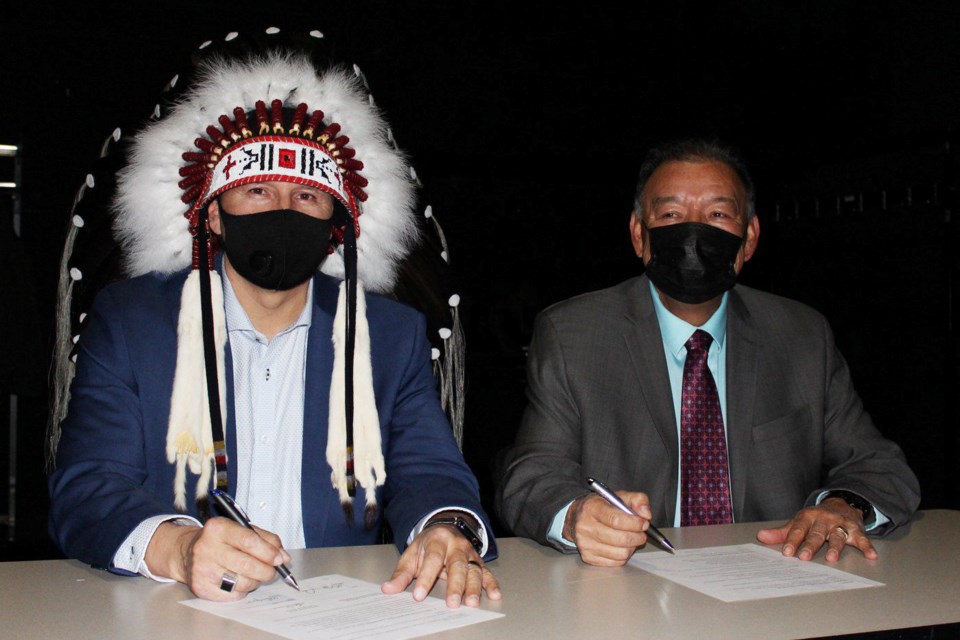An agreement between the University of Alberta and Yellowhead Tribal College (YTC) will see the continuation of the successful Indigenous Community Industry Relations (ICIR) certificate and the Indigenous Community Engagement (ICE) citation.
“If the university wasn’t in a position to continue it, we would have taken it all. In fact, we were talking about that in one iteration of our negotiations, (but) we decided we would like a partnership,” said Diana Steinhauer, president of YTC.
The Memorandum of Relational Understanding between the two post-secondary institutions, announced Oct. 27, lays out the roles and responsibilities each holds in the co-delivery of the programs, which provide professional development for people, both Indigenous and non-Indigenous, who are currently working in industry or with First Nations in government.
ICIR and ICE both include Indigenous knowledge-based courses in a syllabus that was written by a First Nations academic. The work was then vetted through Elders.
The goal of the programs, says Steinhauer, is to provide “a grounding in who we are, what our worldview is so (the students) can understand what the protocols are that we follow. They can appreciate that and find a better working relationship.”
The delivery of the programs began in 2015 through U of A faculty of extension. Dr. Fay Fletcher, lead for the faculty, hired Dr. Patricia Makokis, a scholar from the Saddle Lake Cree Nation, to oversee all aspects of the program. Under Makokis’ leadership, the programs were co-developed and co-delivered through academics and Elders. However, when Makokis met her contractual commitment, the faculty was unable to find someone to fill her position.
“Because of the nature of this program, it was essential to have a First Nations or Métis person in that role. Since they couldn’t find anybody, I brought to their attention the option of co-delivering the program through our college. That really alleviated the need for them to look for somebody entirely. With this co-delivery we took on all of the Indigenous knowledge programs,” said Steinhauer.
The offer from YTC could not have come at a better time as the faculty of extension experienced major budget cuts.
Those budget cuts delayed the start date for YTC to deliver the program. The hope had been to finalize everything in spring, but that was delayed until October.
And with coronavirus pandemic measures in place, courses will be offered on-line. When students can once again gather at the college, Steinhauer says class size will max-out at 30, which is the most seating available in the largest classroom. There are presently eight students enrolled to complete courses and the intake of new students is about to get underway.
For the U of A, the partnership allows the university to address the Truth and Reconciliation Commission of Canada’s Calls to Action, which state that the steps toward reconciliation ‘require skills-based training in intercultural competency, conflict resolution, human rights and anti-racism.’
“We’re really excited to be able to take these next steps with Yellowhead Tribal College in developing and delivering programming that embraces Indigenous knowledges,” said Florence Glanfield, vice-provost of Indigenous programming and research for the U of A.
For YTC, the partnership enhances the college’s credibility.
"With this partnership, we make a historic move to have Indigenous students surrounded by their culture, Elders supports and Indigenous academics at YTC, while accessing programming from one of the finest universities in the world,” said Chief Tony Alexis of the Nakota Sioux Nation, a representative on the Yellowhead Tribal College Executive of Chiefs
“It provides us with an opportunity to market to First Nations, government and industry. It widens our sphere of potential students,” said Steinhauer.
Already ICIR and ICE have attracted participants from numerous provincial government departments, including energy and Indigenous relations, as well as judges and industry.
In fact, the Circle for Aboriginal Relations, which encourages mainstream industry to increase its working relationship with Indigenous communities and businesses, put money towards developing the programs and has been integral in promoting the programs to its members.
“For the past five years, there has been an advisory circle and industry played a role in that. That advisory circle still exists and is included in the memorandum,” said Steinhauer.
Steinhauer’s involvement with ICIR and ICE goes beyond her position as president. She was involved in the development and is now one of the instructors.
“I’ve been told it was transformational for the people who took the classes and graduated. Transformational in that they became aware for the first time of the knowledge base that we as a First Nation people hold and it opened their eyes and transformed their understanding so that they could become better in their roles, better serving all First Nations,” she said.
YTC is a First Nations post-secondary institution situated on Treaty 6 territory and located in Edmonton. It was established in 1986 by the Yellowhead Tribal Council (Alexander First Nation, Alexis Nakota Sioux Nation, O’Chiese First Nation, and Sunchild First Nation).
Shari Narine, Local Journalism Initiative Reporter
Read more from cfweradio.com



